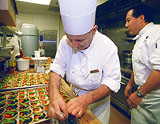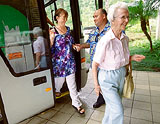Hoping to reap Waikiki's rewards
Patti Nakagawa
Vice president, consumer marketing, DFS Hawai‘i
Married, 16-year-old daughter Tamra
Patti Nakagawa takes Waikiki’s pulse every day, and with a doctor’s precision, either declares it strong or metes out a remedy.
As the marketing pro for luxury retailer DFS Hawai‘i, she knows how many people have arrived on the island each day and how many of them have come to DFS; she knows how many visit the store more than once, and how much they spend. She decides which promotions should run, what publications should carry them, and which printer should produce them. If visitors fall off, or a campaign doesn’t work, she will kill it — and all the revenues going to local businesses from it.
“If we decide to discontinue advertising, it affects someone else’s commission,” she says.
And Patti’s personal decisions also touch other lives.
In the coming year, she would like to buy a new car, but she says her real priority is finding a new home so her aging parents can come live with her family. And as the older generation comes, another generation prepares to leave. Patti’s daughter Tamra, a dancer who will perform next year in the Merrie Monarch Festival, will be a junior at ‘Iolani School later this month and will be getting ready for college.
“I wanted to do it this year, but it doesn’t look like it’s going to happen,” Patti says about finding a new home. The main problem, she says, is that she and her husband, Nelson, a manager in First Hawaiian Bank’s electronic-banking division, have lost a good bit of money on their three-bedroom Makiki townhouse, bought when real estate prices were higher. “Now I’m thinking about college expenses, which is in two years.”
Meanwhile, Patti continues to drive her 1988 Volvo. Though repairs and new tires recently sucked up $1,000, she says she simply can’t justify a new car right now. “It just seems like a frivolous expense,” she says.
The family’s finances could be helped if Patti receives a good bonus this month. But with less than stellar spending this year by Japanese visitors, once the backbone of Waikiki’s luxury retailers, she says she’s uncertain of what will be in this year’s bonus envelope.
“We did anticipate a turnaround in the business this year, but we’re not making the numbers we expected,” she says. “We are getting a slight increase in Japanese, but they’re spending less.”
Hopes are high that the renovated DFS Galleria, due to open in February, will get more visitors moving and spending in Waikiki. And if state- and island-wide marketing efforts can deliver higher-spending visitors, so much the better.
For now, Patti says she wants to focus on Tamra.
“The most important thing for me right now is to really take advantage of the time I can spend with her until she goes to school,” she says. “My life kind of revolves around her right now.”
Wayne Hirabayashi
Executive chef, Kahala Mandarin Oriental Hotel
41, married, baby daughter Shyen
 |
| Wayne Hirabayashi, executive chef at the Kahala Mandarin, watches as head baker Hans Habegger prepares a fruit tart dessert. |
Wayne Hirabayashi is strutting around the Veranda restaurant in spotless chef’s whites, arms stretched out like a belly in front of him, imitating a group of high-spending foodies who recently came through the hotel.
“They just eat!” says the amiable McCully boy who has risen to the heights of culinary excellence. “Every night! We had a big cocktail-pupu party outside, like sushi station, everything, and then they came in for a seven-course dinner. I mean, you know, like 250 of them and I charged them I think $180 a head, but I had beluga caviar, truffles, terrine of foie gras, the works.”
Such guests are a chef’s dream.
Each day, the number of guests at the hotel affects what Wayne spends on food and staff. For instance, with the hotel only about half full, as it is on this particular day in June, Chef Wayne has issued an edict: no one buys anything without his signature. He can’t risk over-ordering when there are not enough visitors to consume the food.
But big groups — especially big-spending and big-eating groups — give a higher return per meal, letting him buy in bulk and get more efficiency out of chefs by having them perform assembly-line functions instead of the specialized tasks of serving individual restaurant patrons. Large, expensive banquets mean more fun for Wayne, more hours for his staff, and more business for local suppliers.
When the food group was in town, Wayne used 18 chefs to serve a complicated meal for 250 people, a number that normally would require only eight servers. Preparing the rare feast also required more lead time and attentive expertise, some of it accomplished only by calling people in on their days off.
“When these guys go on overtime they make more than me!” he says about his unionized workforce. He estimates that 65 cents of every dollar the hotel takes in goes to labor costs.
The chef spent $7,000 on products for the banquet, about twice as much as usual. About $2,000 worth of foie gras, $1,000 worth of beluga caviar, and six cans of truffles all came through local importers. Produce came from Waimanalo.
“It’s a cycle,” he says. “If the tourists come in, then of course, we have the business, then we have to buy the products. And then in return the farmers have to grow. I try to use all the local vegetables, local meats, fish, of course.”
But Wayne says the free-spending foodies may have inspired him to irrational exuberance.
June’s magic number was about $1 million in revenue, and on this day midway through the month, he is less than halfway there. Blow the budget, and the bonus — which can be a significant portion of his income — may not materialize.
“I’m really starting to get worried now,” he says.
Wayne needs to make those numbers, not just for pride, but also to fund his main expense these days: 6-month-old Shyen.
Wayne is the family’s primary breadwinner, and says he never realized what a big expense such a little person could be.
“I didn’t realize what you have to buy,” he says in amazement. “The stroller, the tub, the car seat, the diapers, wipes!”
Wayne would like to buy a house in the next two years, he says. But the family is considering a move to the Mainland, where his wife, Yuko, a flight attendant for United Airlines, is based. United shifted 300 Honolulu-based flight attendant jobs to the Mainland in November 1998 because of cutbacks in its Japan schedule, and Yuko was reassigned to Chicago. Living closer to Yuko’s work might make life easier, Wayne says, but his mother would lose her baby-sitting gig.
“We’re thinking about moving to the Mainland so she doesn’t have to commute so far,” he says. “But who’s gonna baby-sit when she flies?”
Emiko Miyasato
Supervisor of operations, Hankyu Express USA
52, mother of two, Okinawa native
 |
| Emiko Miyasato, a supervisor at Hankyu Express, books activities for Japanese tourists. Because she is on salary, Emiko’s regular paycheck wasn’t affected when bookings by Japanese tourists declined. In 1999, Japanese visitors to O‘ahu fell more than 9 percent from the year before. |
Emiko Miyasato used to receive a nice year-end bonus from the Japanese wholesaler she works for. But when business got soft about two years ago, the yearly bonus was replaced with a company trip, which comes only every two years. The mini-vacation has proven a more economical way for Hankyu Express to reward workers, especially since it gets good rates from airlines, hotels and other travel businesses.
“For me right now, the trip is better,” says Emiko, who went to Los Angeles in June, where the group toured Universal Studios and Disneyland. “That way, we can enjoy life some more.”
In 1999, Japanese visitors to O‘ahu fell more than 9 percent from the year before. Companies such as Hankyu Express, which sell Hawai‘i tour packages — the way most Japanese prefer to travel — felt much of that decline. Japanese visitors are returning to O‘ahu slowly this year, up less than 2 percent through June. But retailers and others say even those who are coming seem to be spending less.
At Hankyu, Emiko books visitors’ dinner cruises, Tantalus tours and other optional activities, the very things they often cut out when they’re watching their budgets. Emiko says she has seen a change in the last two years, and the Hawai‘i Attractions Association reports a 3 percent decline in attendance at its member museums, submarine tours, luau and other attractions for the first quarter of this year. Attendance by eastbound visitors is down more than 12 percent.
Like everyone at Hankyu, Emiko is on salary and does not earn a commission on her sales, so it doesn’t hit her wallet directly when bookings go down.
Emiko came to Hawai‘i from Okinawa 26 years ago, and though the 52-year-old mom runs a single-income household, she says she never depended on the year-end bonus, so going without it another year won’t affect her plans. Her 20-year-old daughter, Sherry, is on a full scholarship at Hawai‘i Pacific University, and her 24-year-old son, Chad, is a self-sufficient computer industry worker in Texas.
But even if the Japanese visitor count doesn’t affect Emiko’s paycheck, it could change her plans for an October trip to Las Vegas with some girlfriends.
“If the business is busy, I’ll stay back with work,” she says.
Angela Vento
Director of sales and marketing, Sheraton Waikiki and Sheraton Royal Hawaiian Hotel
37, Newlywed
 |
| Angela Vento, sales and marketing director at the Sheraton Waikiki and Royal Hawaiian Hotel, with Jane Nakano of the Sheraton’s reservations department. |
“Wednesday gets hard,” says Angela Vento, a director of hotel sales in Waikiki who is newly married to a man on Maui. “By that time, it’s a little lonely. By Thursday, you can see the light at the end of the tunnel.”
Angela can tell you that a commuter marriage is not ideal — and certainly not cheap — but she and her husband, Art, who celebrated their first anniversary in June, manage to get their quality moments by flying to see each other every weekend.
“I usually fly home on the 8:05 flight — Ronald at Aloha Air checks me in. I know him by name!” she says with a giddy grin, as this day just happens to be Friday.
Angela and Art, who is general manager of the Maui Arts and Cultural Center, agreed she should take the job on O‘ahu because it offered a great career opportunity, with a larger staff and higher profile properties than her previous position at the Sheraton Maui. But juggling the emotional strain — as well as the expense of plane tickets and three homes on two islands — gets tiresome, Angela says. In the coming year they will try to find a balance.
“We’re trying to decide what our true direction is,” she says. “Career is important for both of us. And at the same time, how do we spend the quality time together and begin a family if we want to? That’s the thing that we’ll look for: How do we take what we’ve learned so far and improve upon that?”
During the five days a week she’s on her own, Angela looks for ways to get people through the doors at two of Waikiki’s landmark hotels, the Royal Hawaiian and the Sheraton Waikiki. Building the meetings and conventions business is one of her main missions, which puts her on exactly the same wavelength as state officials and other industry executives.
“One of the things we have deemed a necessity is to diversify our business mix,” she says. “That will help us endure any changes in the economic conditions. That’s what we’re trying to accomplish here in Honolulu, in particular at the Sheraton Waikiki.”
Tourism officials have given the Hawai‘i Visitors and Convention Bureau $6 million a year through 2002 and marching orders to fill the Hawai‘i Convention Center with 40 events and 220,000 people annually, starting in 2004.
Even bureau executives admit they have their work cut out for them. The bureau is roughly on target this year, only 5,000 people short of its goal. But Angela and other executives say they worry about 2001, when the bureau is supposed to snag 31 events with 106,500 attendees. So far, only 12 events are booked, with only 30,000 confirmed attendees.
Building O‘ahu’s business profile could bring higher-spending visitors and help fill rooms during slow periods. But any change in business at all shows up in the pay check of anyone in Waikiki who makes a bonus, as Angela does.
She and Art have no particular plans riding on this year’s bonus, Angela says. Both will continue to drive the cars they have: her 1994 red Ford Mustang convertible, which, she says with relief, is completely paid off, and Art’s company truck. But extra cash does help with expenses, such as airfare every weekend, entertainment and dining (“My best dinner is reservations,” Angela says), and managing the various rents and mortgages. They try to keep the KÅ‘anapali condo they bought before they married rented out to visitors, while Art lives in an apartment in Kihei.
“It makes it convenient for airport runs,” Angela says. “Time together is more important.”
Garfield Namahoe
Driver, Polynesian Adventure Tours
42, married, two children
 |
| Garfield Namahoe helps tourists out of a Polynesian Adventure Tours bus at the Ko‘olau Golf Course, where the group had lunch during their Circle Island Tour. |
A new car and keeping his daughter the karate champ in tournaments: that’s what Garfield Namahoe is saving for.
The 42-year-old driver for Polynesian Adventure Tours is shooting to replace his 1988 Mitsubishi van or his 1986 Honda Civic by the end of the year. His 10-year-old daughter, Chanel, a brown belt in karate and two-time Athletic Amateur Union national champ in her age group, likes to compete at least once a month — sometimes on the Mainland — a proposition that runs into hundreds of dollars through the year.
“She’s been taking karate for almost four years now,” he says with pride. “She’s done very well out there. Her strongest event is kumite, or sparring. There are other events like weapons, and she does that. I try to get her into as many tournaments as I can.”
A car from the early ’90s will cost about $5,000, he figures. For his daughter, tournament fees run between $45 and $60 per event. When they’re on the Mainland, such as the tournament she competed in last month in Sacramento, the cost skyrockets. Luckily, Garfield’s wife, Frienda, works for Hawaiian Airlines, so airfare often isn’t a problem.
His straight wages at $10 an hour don’t go as far as he’d like toward providing the things his family needs, Garfield says, even though his 18 years with the company ensure he works at least 40 hours a week, and often as many as 60 hours.
“The gratuities, the tips the passengers give, that’s where you get that extra money,” he says. “It helps put food on the table.”
Tips can nearly double his income, Garfield says, sometimes totalling $300 a week, or even more when a convention is in town. Spoiled by the high-flying folks from the American Dental Association, who put $1,200 in gratuities in his pocket during their four-day convention last October, he was hoping for a similar bounty from the Lions Clubs convention, which rolled through town in June. But that group let him down, adding only about $600 extra to the pot.
Most of that went straight for the Sacramento tournament, he says, and for some bills.
Things have picked up since the beginning of the year, Garfield says, when visitors were sparse on O‘ahu, and he was eating peanut butter sandwiches regularly to try to save money.
“I like peanut butter, but I like other stuff, too,” he says. “But you gotta do what you gotta do.”
To fill in the gaps when times are slow, Garfield buys kukui nut oil from a wholesaler and sells it through newspaper advertisements and word of mouth. He also sells vitamins and other products through Quixtar Inc., an Amway Corp. company. The extra cash, sometimes more than $500 a month, can help in the slow times.
This year, Garfield and his family also would like to pay off some of what he estimates to be about $35,000 in debt, accumulated with purchases of clothes, a washing machine to replace the one that broke, and other items.
“I’d love to own a house,” he says. “And of course, the main goal is to clear out debt. I want to do that first and try to save a little on the side.”